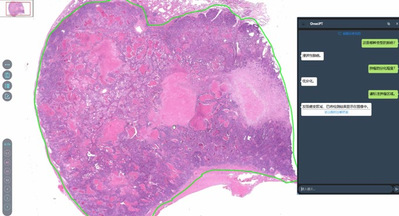Artificial intelligence (AI)-enabled medical diagnostic tools are improving cancer screening accuracy, helping doctors arrive at more precise diagnoses and enhancing treatment quality.
Zhejiang University has recently launched OmniPT, an AI-powered universal pathology assistant integrating vision and language models for human-computer interaction. The model is currently deployed at the Department of Pathology, the First Affiliated Hospital, Zhejiang University School of Medicine(FAHZU), focusing on high-incidence cancers such as gastric,
colorectal, and cervical cancers. The hospital in Hangzhou, Zhejiang Province, is the first clinical institution in China to use an AI-powered pathology assistant.

According to FAHZU, OmniPT has achieved multiple breakthroughs in laboratory testing, including cancer classification, grading, vascular/neural invasion identification, and prognostic
marker discovery. Analyses and predictions by OmniPT have been 80 to 90 percent accurate across cancer types.
Most patients and their families are unfamiliar with the details of pathology examinations — work performed on tissue samples or cells in a lab. When biological samples from a patient are sent to a lab, experts undergo a rigorous process to understand the pathological changes and the nature of the disease in the specimen. The role of the pathologist is to help reach an accurate diagnosis by applying rigorous empirical standards.
However, China faces a severe shortage of pathology professionals. “Many people may know that pediatricians are in short supply, but pathologists are even more rare. Currently, our country needs 150,000 to 200,000 pathologists, but there are only about 30,000 officially registered,” said Professor ZHANG Jing, chair of the department of pathology and vice president of the Yuhang campus of FAHZUl.
Beyond this massive gap, there are also regional imbalances. While cities like Beijing, Shanghai, and Hangzhou may be facing less severe shortages, the situation is dire in remote areas, he added. Additionally, the long training period further complicates the issue, as
young pathologists often lack sufficient experience. Against this backdrop, OmniPT,
developed by Professor SONG Mingli’s team from Zhejiang University’s College of Computer Science and Technology, in collaboration with FAHZU, is facilitating fast, accurate clinical diagnosis. By leveraging human-computer interaction and focusing on pathologists’ needs, OmniPT significantly improves diagnostic efficiency and quality, helping to alleviate the shortage of professionals.
For more information
Contact us: jzhang1989@zju.edu.cn
